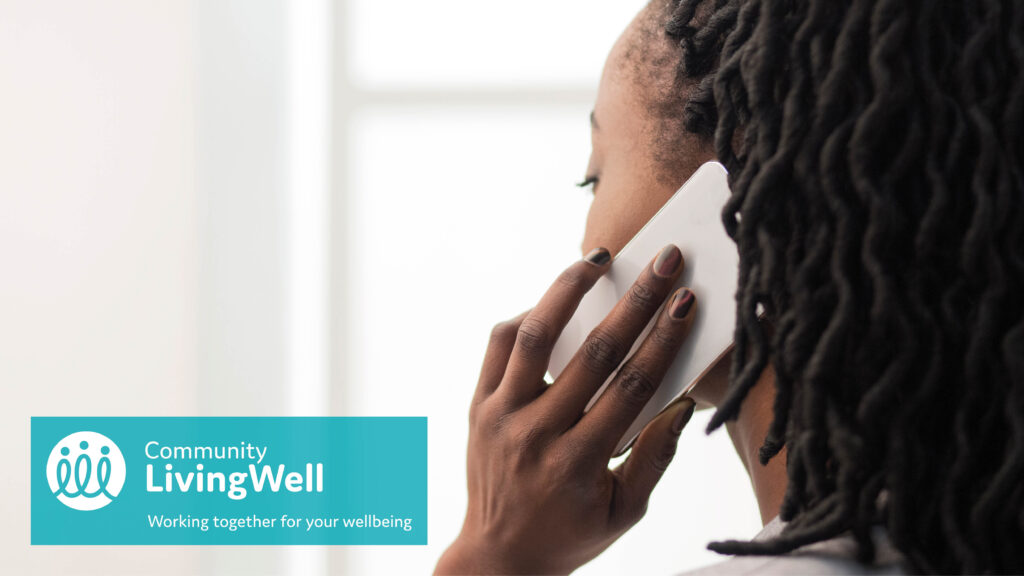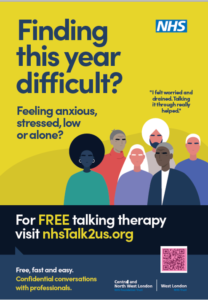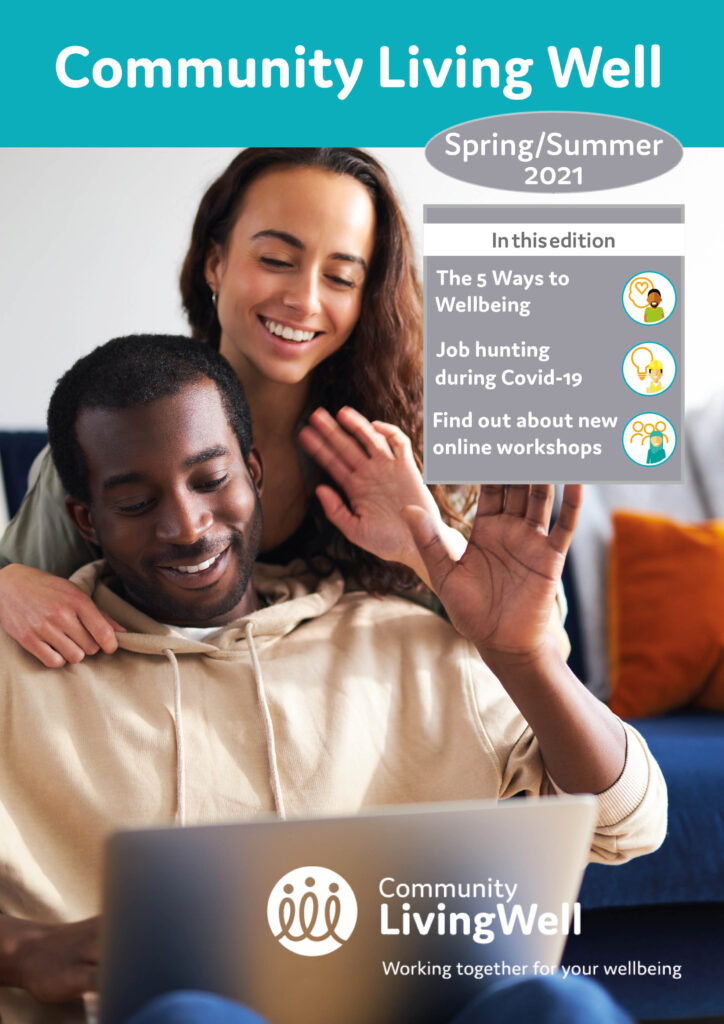Latest News
Pilot Mental Health Programme for Young People
Community Living Well Pilot Mental Health programme for young people aged 19-24 with mental health needs
The Community Living Well Self-Care service is trialling a new programme for young people aged 19-24 with mental health needs (in Primary Care), and who are registered with a GP in Kensington & Chelsea, Paddington or Queen’s Park.
The pilot mental health programme includes a choice of four options:
- A two-part series of (2) workshops – You may register to attend on your own or with a friend
- Seated therapeutic, fully clothed, massage or reflexology sessions for pain and relaxation
- 1:1 phone-guided meditation,
- 1:1 phone or online motivational coaching.
So, what is involved?
The two-part interactive workshops will explore breath work, meditation skills and the power of different pressure, to help increase confidence and capacity for decision making.
Both workshops will begin with an introduction to breathing/body-scan/meditation, in different positions (lying down, sitting, standing and moving), with discussion on how these affect the body. We break for lunch and offer a light lunch to participants.
The second part of workshop each workshop will be a practical session, guided by a qualified trainer. Participants will be given the opportunity to learn about the affect of different pressure, with discussion and feedback on how the it feels and whether it affects the body locally, mentally or emotionally. Participants do not have to take part in the practical element if they do not wish to but can observe and learn instead.
The session will close with a short guided meditation.
The Unwind therapeutic massage /reflexology sessions are aimed at improving relaxation and sleep and reducing pain and anxiety.
The guided meditation session, over the phone, will provide a listening ear and a focus to help with the concerns you express on the day and teach you meditation skills that you can practice on your own.
The motivational coaching via the phone or video call, will discuss which areas you feel need help with, provide encouragement and teach you achievable goal-setting strategies.
How to register
To register for this service, you must be aged 19-24 and registered with a GP in Kensington & Chelsea, Queen’s Park or Paddington. Complete this form and return it to [email protected]
Author: Stewart Gillespie
Category: Community Living Well, Self-Care
Posted on: 20th September 2021
World Suicide Prevention Day 2021
Friday 10 September is World Suicide Prevention Day and this year’s theme is ‘Creating Hope Through Action’ – a reminder that there is an alternative to suicide and that our actions, no matter how big or small, may provide hope to those who are struggling.
Many of us are affected by suicide or suicidal feelings throughout our lives. Even though mental health awareness has increased in recent years, talking about suicide is still widely stigmatised. Too many of us suffer in silence.
“I couldn’t see past the pain. It was a different reality for me. I only knew I wanted the pain to stop, the anguish to go away.”
We know that it can be scary talking to someone about their suicidal feelings, but it really can make a difference.
If you need to speak to someone urgently, you can contact the following:
- CNWL NHS Single Point of Access (SPA) on 0800 0234 650 (24/7)
- Samaritans on 116 123 (24hrs a day, 365 days a year)
If you are struggling with suicidal thoughts yourself, national charity, Mind, has some information you may find helpful, including how you can access treatment and support. And if you feel that your life is at risk, please seek urgent medical help now by calling 999 or going straight to A&E if you can. Mental health emergencies are serious. You’re not wasting anyone’s time.
Please take care of yourself.
IF YOU ARE EXPERIENCING SOME OF THE ISSUES MENTIONED…
If you feel you need additional support, our Talking Therapies service may be able to help. You can register for the service by completing this self-referral form.
Talking to people who have a shared experience and who understand what you’re going through can help you feel less isolated and boost your confidence. Find out more about our Peer Support service and how it can help you.
Author: Stewart Gillespie
Category: Community Living Well
Posted on: 8th September 2021
Talking Therapies Webinars August

The next course of Talking Therapies (IAPT) webinars start in August.
The Talking Therapies webinars can help to support you and teach you ways to help manage your stress, anxiety and other emotional difficulties.
MOOD BOOST
Tuesday 10 AUGUST @ 4:00 PM – 6:00 PM
This 4-week group can support you in understanding low mood and how it can impact you on a daily basis. The group aims to support you to better manage and improve your mood through learning of different strategies in an interactive way. You are not expected or encouraged to discuss personal details of your struggles, and evidence shows that having peers learn together has positive effects for recovery.
Sessions include: psycho education of low mood and breaking the negative cycle of low mood, setting goals, motivation getting activated with different types of activities, negative thinking styles, and tips for well-being.
STRESS LESS
Tuesday 17 AUGUST @ 5:30 PM – 7:30 PM
This 4-week group can support you in understanding generalised anxiety and how it can impact you on a daily basis. The group aims to support you to better manage your anxiety by learning different strategies in an interactive way. You are not expected or encouraged to discuss personal details of your struggles, and evidence shows that having peers learn together has positive effects for recovery.
Sessions include: psycho education of generalised anxiety and breaking the cycle of worry, how to deal with multiple worries and relaxation techniques.
These courses are available for people aged 16 and over who are registered with a GP in the Royal Borough of Kensington and Chelsea, or the Queen’s Park and Paddington areas of Westminster.
To attend this group you must be registered with the Community Living Well Talking Therapies (IAPT) service. To refer yourself please complete this quick online form or call 020 3317 4200.
Find out more about the Talking Therapies (IAPT) service
Other events, workshops and webinars
You can find out about all of our upcoming events here. The calendar is updated regularly, so be sure to check back for all of the latest information.
Author: Stewart Gillespie
Category: Community Living Well, Talking Therapies
Posted on: 4th August 2021
Self-Care: The ClementJames Centre

Having started life over 40 years ago as a humble homework club, The ClementJames Centre now offers employment support, adult learning, children and young people’s education and wellbeing support for members of the local community, and beyond.
Through a range of 1-to-1 sessions, group activities and classes, ClementJames offers wrap-around support for the adults, young people and families they work with.
Wellbeing Activities
When it comes to wellbeing activities, ClementJames offers an array of groups, courses and one-off events throughout the year. Both the Speaking Group and Reader Group run weekly, ordinarily taking place at the centre itself, but remotely via Zoom for the time being.
Through activities and games, members of the Speaking Group get to practice their spoken English in a relaxed and friendly environment. Those that attend the Reader Group come together to share in the magic of reading, by discussing the set novel extract, short story or poem.
The Women’s Confidence Programme
The Women’s Confidence Programme (WCP) is made up of a course, two conference-style days and a trip. The WCP course brings a group of women together for one morning a week for six weeks, to work on developing skills, such as communication, active listening, confidence, self-compassion and boundaries.
Through creative activities, independent reflective practice and discussion, the group not only develop these important skills, but share experiences and form friendships. The fourth online format of the course will be running April-May, with the hope that the course can return to in-person at the centre in the autumn.
Celebrating creativity
Celebrating and using creativity – in its varied forms – is a central part of many ClementJames wellbeing activities. ‘CJ Creates – This is Me’ is an annual spring showcase of creative worked, produced by adults, young people and children alike, around a particular theme. Last year’s online exhibition focused on ‘Belonging’, and saw a variety of submissions, including paintings, sculptures, recipes and photographs.
The annual ‘CJ Creates – Express Yourself’ is all about celebrating and developing young people’s creativity. Over the course of four days last July, the group explored the relationship between creativity and social justice, taking part in workshops with organisations, such as SPID theatre, and creating their own works, such as miniature statues and lino-printed tote bags.
Nutrition and Gardening
Getting outside as an effective way to boost wellbeing is also promoted through monthly gardening sessions and the Nutrition and Gardening course. During the monthly sessions, attendees work together with the professional gardener, developing gardening skills whilst making connections with other local people.
Taking place a morning a week for four weeks in early summer, the Nutrition and Gardening course takes advantage of the produce growing in the garden, by promoting an interest in nourishing our minds and bodies. Gardening sessions have been on hold whilst the Centre has been closed, but hope to be able to re-start with small groups by mid-spring.
Employment Support
Clients who take part in ClementJames’ Employment Support Programme reported an increase in wellbeing. The 1-to-1 sessions are tailored to the needs of the individual, but focus on employment and training-related skills such as CV building, interview practice, online job searches and goal setting (to name a few). Clients who engage with this programme also report an increase in key wellbeing indicators, such as confidence and independence. At the moment the sessions are happening via telephone and video call, but come summer term, ClementJames hopes to be able to restart in-person sessions at the Centre too.
How to refer to Community Living Well Self-Care
The ClementJames Centre is part of the Community Living Well Self-Care programme. Other services include emotional and practical support in your language, Well Read play-reading group, massage therapy, My Recipe, My Story, and volunteering opportunities.
To find out more, or to refer yourself to the service, call us on 020 3317 4200 or complete this online form.
This article was originally published in the Spring/Summer 2021 edition of Community Living Well magazine. To subscribe to receive the magazine, complete this form.
Author: Stewart Gillespie
Category: Community Living Well, Self-Care
Posted on: 23rd June 2021
How Talking Therapies can help you

Throughout the pandemic, Talking Therapies (IAPT) have provided support for people who were self-isolating or anxious about the impact of the virus on themselves, their families and loved ones. Find out how Talking Therapies can help you by reading about other people’s experiences.
How Talking Therapies can help
Talking Therapies (IAPT) provide a range of support for when you experience difficult emotions, such as low mood, anxiety and stress. They can also support people with managing the practical and emotional aspects of living with long-term physical health conditions.
Last month, we gathered feedback from those who have received support from our team. People talked about how caring and understanding their therapists were, that their sessions were tailored to their individual needs, and how they learnt techniques they can use to cope.
Caring
“[My therapist] was caring, friendly, reassuring and professional. I found the process very helpful.”
“They have been incredibly supportive and helpful throughout and the sessions have offered me insights, guidance, tools and methods to work on myself. It’s been a very positive experience. Thank you.”
“I will be forever grateful for their genuine care and support.”
Flexible
“Had a really good experience with this service this time round. Felt like [the therapist] really listened and adjusted my appointments according to my needs.”
“I am so thankful for all of your help and guidance in all of my sessions. My therapist was friendly at all times and made me smile and laugh while remaining professional. She was amazing at being so understanding of my shift pattern and always working to find available sessions for me. I always felt she was going the extra mile to support me and give me reading and tools to use between sessions. I couldn’t have got through the pandemic without this. Thank you for all your help.”
“They listened to my problems with real care and attention and were happy to tailor the sessions around my specific needs. Their insights and curious nature have prompted me to find answers that I didn’t know I had. I found them to be extremely warm, kind and professional.”
Learn
“Extremely happy with the service provided by [my therapist]. She taught me coping techniques for life which I am most grateful for.”
“They were amazing throughout my sessions. They helped me a lot and taught me how to deal with my anxiety. I really appreciate everything they have done.”
“The treatment I have received has been extremely useful in understanding my thought processes and how to make behavioural changes that will make a difference. I have increasingly used some of the coping tactics over the course of the treatment and I have seen a marked improvement in my positivity and reduced levels of anxiety and stress.”
“They provided me with invaluable tools that I will and can continue to use. They empathised and explained how they hoped the tools would work then always checked in with me. Amazing service from an amazing person.”
Commitment
“Her commitment to my care was clear, as she would come to each session prepared with new ideas and methods to help me break through deeply ingrained fears and challenge long-held beliefs. Her patient and empathetic manner created a safe and supportive environment where I could openly share my concerns and find the solutions and encouragement I needed to work through each new challenge.”
“My time with my Community Living Well therapist has had a remarkable impact on my mental health and well-being. After several unsuccessful experiences with therapy over the course of many years, I have been amazed by the progress I was able to make in just a few months.”
“My experience at the clinic, although all done through Zoom because of COVID, has changed my life forever. Getting myself on the waiting list for the clinic was one of the best decisions I’ve ever made.”
How to refer to Community Living Well
If you feel you need extra support with any difficult emotions, such as low mood, stress or anxiety, and would like to speak to someone, don’t hesitate to contact us. You can ask your GP to refer you, complete this online self-referral form or call 020 3317 4200.
Author: Stewart Gillespie
Category: Talking Therapies
Posted on: 25th May 2021
Talking Therapies – Lise’s Story
Talking Therapies provide a range of support for when you experience difficult emotions, such as low mood, anxiety and stress.
Lise has struggled with anxiety for most of her life. We spoke to her to find out more about how her recent experience with Talking Therapies has helped her to cope.
How did you hear about Talking Therapies?
I heard about it through my GP. I’d had a bad year and was struggling. She offered not only medication but also the opportunity to refer myself to talking therapy. I was nervous, as I haven’t had great experience with therapy in the past, but I felt I needed something to change.
I completed the referral form and then within a week someone was in contact and we started the process. I didn’t expect it to happen so quickly – it was so easy!
Which kind of therapy did you receive?
I had Cognitive Behavioural Therapy (CBT), so my first sessions were an introduction to CBT. I learnt about what it is and how it works. I realised that you can talk forever and ever about trauma in the past, but it’s how you deal with it in the present. I can’t change what happened, but I can do something about it now.
My initial sessions were over the phone. As you can’t see the person, it made it easier to talk, especially at the beginning. As I started to feel more comfortable, it became helpful to see the therapist on a video call. She could share images and diagrams on screen.
It was also super convenient – you’re already at home! I could finish work and then start my therapy sessions straight away, as I didn’t need to travel anywhere. It opens up the opportunity for therapy in a different way.
Can you talk me through how the sessions were run? What did they involve?
The original sessions focused on methods I could use to manage my anxiety, such as tools like starting a ‘worry diary’. Then the sessions became more personalised. With my therapist, we would check-in to find out how I was doing, then we would have a conversation about different themes each week. The themes related to where the anxiety is within me. We discussed problems versus worries, negative core beliefs, and worry issues.
Every week I was given work to do at home. It was made clear that I had to put in the effort; the therapist couldn’t solve the problem for me. It was very inclusive. Together, we would discuss what was next, how I wanted to do it, what I felt I needed. If I didn’t know, then the therapist helped to guide me.
Have the methods helped?
Yes, absolutely. My therapist said, “I will teach you to become your own therapist”, which is a really good point. You can’t become reliant on people, it’s me that has to manage this going forward. We’re now working on a programme for me to use when the sessions have finished.
The whole experience has given me confidence to move forward. I talk about my feelings much more now. My friends and family have noticed how open I am. I’ve learnt that worrying is not abnormal.
Would you recommend Talking Therapies?
Yes, 100% – it has been truly fantastic for me. I’m so hugely grateful to have access to this therapy.
As mentioned, the therapy I’d had in the past wasn’t the best for my situation, but I didn’t know it at the time. This time, I felt so supported and understood. If something isn’t working, your therapist can change it. They listen to how you feel, then steer towards a therapy to help you – you’re included in the decision.
That’s why I wanted to share my story, in the hope that it will help others who may be struggling. There is help out there. Give it a go. You can always stop if you don’t get on with it. It’s important to know that you’re not alone in this.
Refer yourself for Talking Therapy
Our Talking Therapy team can help if you are struggling with low mood, anxiety or stress. Find out more about the service and register.
This article was originally published in the Spring/Summer 2021 edition of Community Living Well magazine. To subscribe to receive the magazine, complete this form.
Author: Stewart Gillespie
Category: Community Living Well, Talking Therapies
Posted on: 12th May 2021
Talking About Suicide

This year has been particularly difficult for all of us; the pandemic and months of lockdown restrictions have had a massive impact on our daily lives as well as our mental health. This is a lot to cope with and it is understandable that many of us are struggling with our mental health and wellbeing or facing challenges in life.
Talking About Suicide
Many of us are affected by suicide or suicidal feelings throughout our lives. Even though mental health awareness has increased in recent years, talking about suicide is still widely stigmatised. Too many of us suffer in silence.
“I couldn’t see past the pain. It was a different reality for me. I only knew I wanted the pain to stop, the anguish to go away.”
It can be scary talking to someone who is experiencing suicidal thoughts, but it really can make a difference.
How can I support someone in a crisis?
If someone tells you they are experiencing suicidal thoughts, always take them seriously.
Ask open questions – this invites them to answer more than ‘yes’ or ‘no’, for example, ‘How are you feeling?’ or ‘What happened next?’
Try not to judge – it’s important not to blame the person or give your own opinion on the situation.
Give them time and listen – be patient, as it has probably been very difficult for them to open up to you.
Don’t be afraid to ask the difficult questions – being direct lets the person know they can talk freely about how they’re feeling. Ask ‘Are you having suicidal thoughts?’ or ‘Have you felt like you want to end your life?’
If you need urgent assistance…
- Contact your GP surgery
- Contact Central North West London NHS Trust’s Single Point of Access (SPA) – a first point of contact for people experiencing a mental health crisis: 0800 0234 650
If you or someone else that you know is at immediate risk:
- You can attend Accident & Emergency (A&E)
- Chelsea and Westminster Hospital, 369 Fulham Road, London, SW10 9NH
- The Royal Marsden Hospital, 203 Fulham Road, London SW3 6JJ
- St Mary’s Hospital, Praed Street, London W2 1NY
- If you have already taken an overdose or injured yourself, dial 999
Additional support…
Mind has some information you may find helpful, including how you can access treatment and support.
The Samaritans are available 24 hours a day, 7 days a week, 365 days a year: call free on 116 123.
If you feel you need additional support with anxiety, depression or low mood, our Talking Therapies service may be able to help. Find out more about the service and register.
Author: Stewart Gillespie
Category: Community Living Well, Talking Therapies
Posted on: 20th April 2021
Spring/Summer 2021 Magazine available now!
Spring-Summer Edition 2021 (best for viewing on mobile device)
Spring-Summer Edition 2021 (best for viewing on desktop)
Welcome to the Spring/Summer 2021 edition of Community Living Well magazine. We hope you have continued to stay well during these extremely challenging few months.
We have heard from many of you about how this lockdown has been especially tough. It has been hard to stay positive and motivated, so in this edition we wanted to highlight some simple things that you can do to help.
The Five Ways to Wellbeing are five steps you can take which can help to improve your overall wellbeing. We’ve suggested a range of different ways that you can incorporate these steps into your daily lives, depending on how much time you have.
We spoke to Lise, who has recently completed some Talking Therapy (IAPT) sessions. She was keen to share her story as she hoped it would encourage anyone struggling with anxiety or low mood to seek support – you can read about her experience on page 12.
PLUS…
There’s practical information on avoiding burnout at work, advice if you are looking for a new job, plus tips on how you can try to improve your sleep.
If you have any suggestions, features, stories or feedback about the magazine, please contact me, Stewart, at [email protected].
Community Living Well is a mental health service for those registered with a GP in the Royal Borough of Kensington and Chelsea, or the Queen’s Park and Paddington areas of Westminster. The services on offer include talking therapies, support groups, help with employment and support with debt, housing and benefits issues. Self-referrals can be made here. For more information please call 020 3317 4200.
Author: Stewart Gillespie
Category: Community Living Well
Posted on: 12th April 2021
Why am I feeling so tired?

If you are feeling tired and sluggish, and finding it hard to motivate yourself to work or keep active, you are not alone!
Last week, The Times highlighted a study published by UCL, which found that we have reached a state of peak demotivation. The UCL Covid-19 Social Study has been following 70,000 people over the past 44 weeks and found that, compared to the first lockdown, most are exercising less and spending less time on enjoyable activities.
In the article, a psychologist explained that this overwhelming feeling of fatigue is a normal reaction to abnormal circumstances.
What can I do about it?
We know we have given similar advice many times before, but following some of these steps may help you to feel better.
1 – Don’t be hard on yourself! As we mentioned earlier, you are not alone in feeling this way. Everyone is feeling the effects of the pandemic in some way or another, so be kind to yourself.
2 – Try to avoid day-dreaming about life before lockdown. Reminiscing about good times you were having before the pandemic can make you feel low in mood, which in turn will reduce your energy levels. Now that some lockdown restrictions are starting to ease, think of your recovery plan – what do you have to look forward to? Meeting up with friends and family, getting your hair cut, picnics in the park – lots to get excited about!
3 – Eat healthy and stay active – we’ve heard it time and time again, but eating junk food and taking no exercise can make us feel extremely tired. Try to limit the amount of comfort food and reset your eating habits. Now the weather is improving, take a daily walk around the block or in your local park.
4 – Put your work away! If you’re working from home, make sure you’re working within your usual working hours. This gives you a structure to your day and sets the boundary between work time and relaxation time.
Additional support
If you are struggling with low mood, anxiety or depression and you feel you need something to change, take a look at the Community Living Well services. Our wellbeing services offer a range of different programmes that may help, depending on your situation.
Find out more about how we can help.
Author: Stewart Gillespie
Category: Community Living Well
Posted on: 16th March 2021
Reach out for free talking therapy
Finding this year difficult? We’re here for you. Reach out for free talking therapy in North West London
The Talking Therapies services across North West London Health and Care Partnership are launching a campaign to remind local residents that mental health services are open and here for them during the pandemic and beyond.
Talking Therapies have been running throughout the pandemic, but we know coronavirus has made stress and anxiety more common for people and we want everyone to know this service is here to help them.
 If you are feeling low, anxious, stressed, depressed or finding it difficult to cope then our teams are here to help. Common difficulties include isolation, bereavement, panic attacks, drinking or eating more and taking drugs. If you’re feeling this way talk to someone before it gets out of hand.
If you are feeling low, anxious, stressed, depressed or finding it difficult to cope then our teams are here to help. Common difficulties include isolation, bereavement, panic attacks, drinking or eating more and taking drugs. If you’re feeling this way talk to someone before it gets out of hand.
Emotional impact
Some people have experienced these mental health issues for the first time during the pandemic while others have seen them return.
Claire Murdoch, CNWL’s Chief Executive, said “The last year has been unlike any other and the emotional impact of the pandemic on families’ mental health and wellbeing has been huge. If you feel everything is getting on top of you, please talk to us and encourage your family or friends to do so too if you’re concerned. Whatever your age, these therapies help.”
Carolyn Regan, West London NHS Trust Chief Executive, said “We know there are people out there not currently receiving the support they need. Talking Therapies services are easily accessible to everyone and we’re ready to take your call. You will speak to trained clinicians who can quickly help you with your mental health and wellbeing”.
Reach out
Visit nhsTalk2us.org and fill in a short online form and our teams will book you in for an appointment to discuss any difficulties you are having and the next steps to take.
There’s no need for you to travel. They’ll speak to you on the phone or in a video consultation. If you prefer to see someone face to face we can arrange this with you.
If you can’t get online easily you can also phone for an appointment; call the team in the borough where the GP you are registered with is located. If you are not sure which service your GP is associated with check on this link or call the number closest to you and they’ll make sure you reach the right team.
The Talking Therapies services across North West London are run by Central and North West London NHS Foundation Trust (Brent, Kensington and Chelsea, Harrow, Westminster and Hillingdon) and West London NHS Trust (Ealing, Hounslow and Hammersmith and Fulham).
The service is not just for difficulties caused by the pandemic, they can also help with pre-existing difficulties such as:
- Difficulties sleeping
- Trouble falling or staying asleep or sleeping too much
- Little interest or pleasure in doing things
- Changes to your appetite
- Feeling tired or having little energy
- Trouble concentrating
- Feeling nervous anxious or on edge
- Worrying too much about different things
- Trouble relaxing
- Becoming easily annoyed or irritable
- Being very afraid of a specific thing (e.g. injections/ needles, certain animals, lifts)
To speak to the service directly Monday to Friday between 9am to 5pm call
- Westminster Telephone: 030 3333 0000
- Ealing Telephone: 020 3313 5660
- Hammersmith & Fulham Telephone: 0300 123 1156
- Hounslow Telephone: 0300 123 0739
- Brent Telephone: 020 8206 3924
- Harrow Telephone: 020 8515 5015
- Hillingdon Telephone: 01895 206 800
- Kensington & Chelsea Telephone: 020 3317 4200
Support in an emergency
Talking Therapies Services are not able to provide immediate support in an emergency. If you require immediate help:
If you live in Brent, K&C, Harrow, Westminster or Hillingdon contact CNWL’s Single Point of Access line (24 hours a day) on 0800 0234 650
If you live in Hammersmith and Fulham, Hounslow or Ealing contact West London’s Single Point of Access line (24 hours a day) on 0800 328 4444
Find out more in the video below:
Author: Stewart Gillespie
Category: Talking Therapies
Posted on: 8th March 2021






